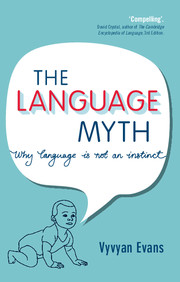Book contents
- Frontmatter
- Dedication
- Epigraph
- Contents
- Acknowledgements
- 1 Language and mind rethought
- 2 Is human language unrelated to animal communication systems?
- 3 Are there language universals?
- 4 Is language innate?
- 5 Is language a distinct module in the mind?
- 6 Is there a universal Mentalese?
- 7 Is thought independent of language?
- 8 Language and mind regained
- Notes
- References
- Index
5 - Is language a distinct module in the mind?
Published online by Cambridge University Press: 05 October 2014
- Frontmatter
- Dedication
- Epigraph
- Contents
- Acknowledgements
- 1 Language and mind rethought
- 2 Is human language unrelated to animal communication systems?
- 3 Are there language universals?
- 4 Is language innate?
- 5 Is language a distinct module in the mind?
- 6 Is there a universal Mentalese?
- 7 Is thought independent of language?
- 8 Language and mind regained
- Notes
- References
- Index
Summary
Myth: Language forms a distinct faculty or module of mind. The language module occupies a dedicated neural architecture in the brain: it is specialised for processing grammar and is inaccessible to other mental modules. It emerges on a pre-specified developmental trajectory and cannot be guided or influenced by other types of information from elsewhere in the mind.
In western thought there has been a venerable tradition in which the mind has been conceived of in terms of distinct faculties. Scholastic thought in the Middle Ages, associated most notably with the theologian Thomas Aquinas, proposed that mental functions were attributes of specific parts of the mind. With the advent of cognitive science in the 1950s, the digital computer became the analogy of choice for the human mind. Computers, like human brains, appeared to constitute a mechanism capable of complex reasoning. Cognitive science took the computational processes deployed by computers as an analogy for how the brain computes the mind. In the mind-as-computer metaphor, the information processing performed by computers is much like human cognition.
- Type
- Chapter
- Information
- The Language MythWhy Language Is Not an Instinct, pp. 133 - 160Publisher: Cambridge University PressPrint publication year: 2014



